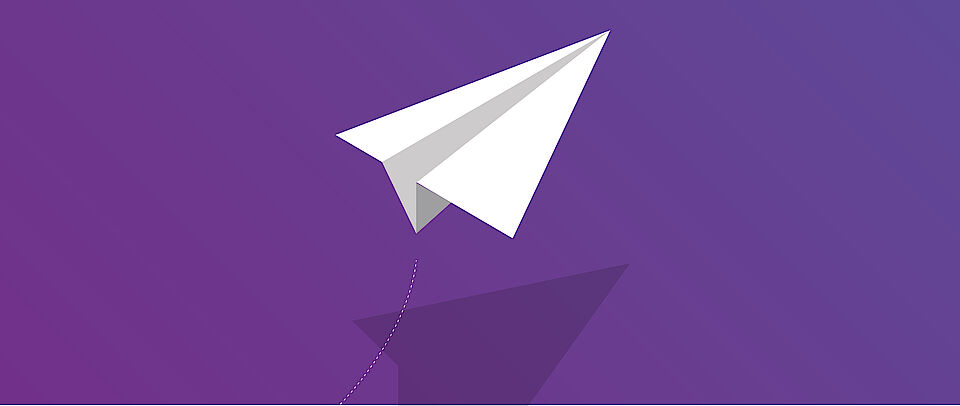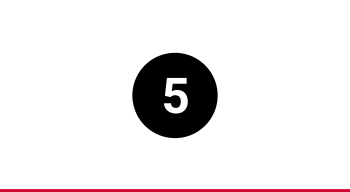
Getting started with
digital learning
According to the strategy of the University of Basel, being a student means not only acquiring knowledge and practical skills, but also learning to think and act critically and creatively. This remains true in our increasingly digital age, whose effects can be felt everywhere in society, from the workplace to the academic world. The following recommendations have been designed to help you get started with digital learning.

Tip no. 1: Fine-tune your equipment
In the past two decades, digital tools have come to play a central role at universities worldwide. While mobile devices such as smartphones and tablets are ideal to receive content – watching videos, listening to music, etc. –, they are not optimized to produce content. For this reason, a vast majority of students use a laptop for their studies (up to 98% according to a recent study of the University of Graz).
Regarding equipment, the University of Basel offers support to its students: in particular, it takes part in the Projekt Neptun through which students can purchase hardware at discounted price, under certain conditions. You’ll find more information on the project’s web page.
Once you have your laptop, the next step is to connect it to the Internet. You can visit this web page of the IT Services to learn how to configure eduroam for wireless internet access on campuses worldwide and how to add a further layer of security through the University’s Virtual Private Network (VPN).

Tip no. 2: Keep your files and data tidy
During your studies, taking good care of your files and data is essential. This is because the files and data on your devices contain a large part of the information you need to learn successfully: consider for instance that today or tomorrow you may type lecture notes on your computer, but you'll need them weeks or even months from now to prepare for exams.
Keep organized to avoid losing files and data: as suggested on the website of the research data team, having a logical file structure, using meaningful file names, applying tags, and deleting unneeded data regularly makes information easier to find. Using specific applications to manage your notes and documents can help (useful applications in this area are note managers such as Evernote or Joplin, and document managers such as Mendeley).
The IT Services of the University of Basel strongly recommend to do regular back-ups of all important files and data (backing up means: having a copy on a separate device or in the cloud, for instance on Switch Drive).
In addition, always be careful with passwords and other access credentials – this means taking the rules about password security seriously (multiple strong passwords); consider using a password manager such as Keepass for ease of use and added security.

Tip no. 3: Strengthen your information literacy
From encyclopedia articles to news or maps for direction, your probably search for digital information several times a day.
As a student, part of your job is to find, organize, assimilate and share information: this is why you'll need to bring your searching skills to the next level. In particular, you'll need to learn how to find not only any kind of information, but specialized, trustworthy information.
For this, you'll learn to use specific search engines and knowledge databases. You'll also learn criteria to distinguish true from fake news, as well as good from bad data. We have collected links, tips and further ressources on this topic on this page.
Saving and storing information and data for reference is also crucial. So-called "reference managers" such as Zotero, Citavi or Mendeley are tools to do just that. They are useful to keep a record of the information you've found. You can use them to store detailed information not only about useful articles and books, but also about any digital object, including web pages, podcasts, videos or e-books. Some of them also double as note managers (see above). The goal is to never lose track of anything that's important.
Be on the look out for any opportunity to strengthen your information and data skills! Your Faculty and the University Library have courses on offer to support you in this.

Tip no. 4: Get acquainted with information design
From short messages in a chat to e-mails, what's more banal than using a mobile device or a computer to write a piece of text? However, as a student, you will probably have to write not just short messages, but structured essays, complete with footnotes and scientific references, sometimes dozens of pages long.
Make sure you know your way around at least one capable word processor.
If needed, the IT Services have courses on offer to help you learn using office programs efficiently.
Next to the classical option of installing an office suite on your computer (such as Microsoft Office or the Open Source program LibreOffice), you can also use online word processors. Such online tools have several advantages: your files can be accessed and edited from any device, including on the go. Moreover, online word processors typically offer collaboration features: when you have to work on a paper with another student, this is much easier than sending files back and forth per e-mail. In most cases, you can even work simultaneously on a document (the technical term for this is "real-time collaborative editing"). The University of Basel provides two online Office Suites to its students: Microsoft Word 365 (login at portal.office.com) and OnlyOffice (accessible through Switch drive).
On the other hand, online office suites are less powerful than their counterparts that run on your computer, and are therefore less suited for very long documents. If you choose to use third-party online word processors, also consider the issue of privacy and data protection, for some online tools may use the online documents for data extraction.
In academic work, statements must be backed up by a clear mention of the source. This not only strengthens your arguments, but also makes sure that you avoid to fall into plagiarism. When writing essays or theses, combining a word processor with a reference manager (described above) can help you save a lot of time: reference managers can automatically insert footnotes and bibliographies into your document.
When you've learned word processing, you can move on to improve your understanding of presentation software (such as Microsoft PowerPoint or LibreOffice Impress) and spreadsheets (such as Microsoft Excel or LibreOffice Calc).
As a final step, you may want to learn more about how to communicate your ideas efficiently by getting acquainted with the principles of information design (for instance by reading a good book on the subject).

Tip no. 5: Strengthen your digital communication skills
Teaching has always been a form of communication, and correspondingly digital teaching is a form of digital communication, which relies not only on specific tools, but also on general rules and habits.
You'll discover that digital communication at universities is still very much e-mail oriented. Students have therefore an obligation to check their e-mail regularly.
As the name indicates, electronic mail is closer in form to the good old letter than to an instant text message, and thus requires a certain form of address and a signature. It also typically uses more formal language (as illustrated with humour in this comic strip). You can check these resources for further advice on digital communication.
Videoconferencing has been on the rise at universities worldwide in recent years. Teaching has also been affected by this, and sometimes courses are delivered entirely using videoconferencing software.
In large classes with many participants, your microphone and sometimes your camera will often be disabled by the teacher, so the experience may feel a lot like watching an online video. In this case, try to get active to make the most of the experience, for instance by taking notes. This flyer entails useful tips on how to use videos for learning.
On the other hand, you will also encounter videoconferences with fewer participants in which interaction between the students is key: for instance, you may be asked to participate in group exercises, or to give an online presentation. In some cases, even oral examinations may take place over videoconference.
In interactive Zoom sessions, there are some rules you can apply to make the session more pleasant for everyone: a good internet connection is important, but good audio and image quality should also be considered. You’ll find our recommendations in this regard in our guide to hybrid and online meetings.

Tip no. 6: Learn methodically
As a student, you'll be provided with a lot of information: however, receiving and evaluating information critically is not all there is to studying. In a second step, the information must be assimilated to make it truly one’s own (and eventually, it is hoped, turn it into long-term knowledge and practical skills). Then comes the phase in which you'll typically take part in examinations to show that you have successfully completed the learning process.
There is no one best way to remember information, improve one's understanding, and acquire skills. To a certain extent, it is a matter of personal preference.
For this reason, you'll have to experiment with different learning strategies and tools, a list of which can be found for instance in this blog post (in German; for English, see the original article). These recommendations by the University of Bern are also worth a look.
Digital tools can be of great help in your studies. On the other hand, learning in a digitally rich environment entails specific challenges.
Digitalization means more flexibility and autonomy: unless you are well organized, there is a risk of getting lost, especially at the level of time and task management. Also, you may feel there is too much information and too many offers. Lastly, the digital devices you use to learn may turn into a source of distraction.
You can respond to these challenges by following these five simple recommendations, which are based on current research (consider for instance this book, this article, or this book chapter).
1. Be organized: start to learn early and assimilate the learning materials in small chunks (as opposed to trying to assimilate the information of an entire semester in just one go). "Binge learning" is rarely efficient, especially from the standpoint of long-term retention.
2. Be focused: make sure to have moments of deeper concentration – just you and the learning material, with all notifications disabled on your devices (research has shown that human brains can't multi-task after all!). If it helps, don't hesitate to go offline: pen and paper are often very useful, even in the digital era.
3. Be active: take notes – not only while reading, but also while watching videos. Re-phrase and structure what you've learned by way of summaries, diagrams, and mind-maps (many tools are available for this, for instance diagrams.net or Excalidraw).
4. Test your knowledge: in order to receive feedback on your learning, don't neglect tests, quizzes and exercises provided by your teachers; you can also create your own tests by using learning flash cards (for instance with a program like the popular Anki, which is free and Open Source).
5. Learn through interaction: what often helps with retaining information is explaining the learning materials to others through discussions during courses and seminars, or in learning groups; similarly, demonstrating something to others is helpful to consolidate skills.

Tip no. 7: Stay safe and get help if needed
It is easy to get fully absorbed by digital tools and media, which may cause strain in the long run (for instance, Zoom fatigue has been in the spotlight recently, see this web page or this recent article).
Take enough breaks and make sure that at least some of them are offline. If you wish, you can use productivity techniques such as the Pomodoro method, in which breaks are part of the general scheme. Also, remember to move and stretch your body regularly. The University of Basel has a varied offer in this area.
For the sake of the environment, don't forget to turn off your devices when you don't need them.
If you need help of any kind, the University offers advice and counselling to students in several areas, including health and well-being.

Tip no. 8: Get an evaluation of your digital skills
If you wish to evaluate your digital skills, you can take the Self-test Digital Literacies provided by the University of Basel.
Also, this web portal contains a wealth of information on digital skills, digital literacy, and digitalization in general.
